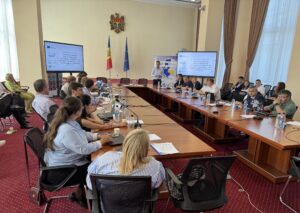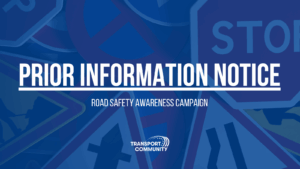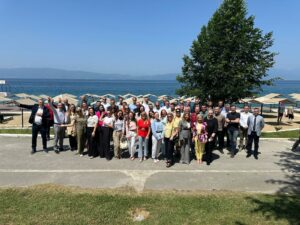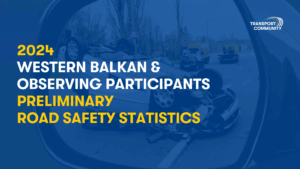Matej Zakonjšek, Director of the Transport Community
Sarajevo – Belgrade Railway Needs to be Faster

You have been recently appointed Director of the Transport Community Permanent Secretariat . What is the Transport Community, and what is its significance for BiH?
The aim of our organisation is the integration of transport markets of Western Balkan regional partners into the EU. We are assisting all regional partners, including BiH, to adopt and implement EU legislation in the field of transport and we are supporting projects that are connecting the Western Balkans internally, as well as with the EU. Transport policies that are based on European legislation and standards will pave the way to seamless integration of the Western Balkans transport markets into the EU, which will in turn offer sustainable connectivity to our citizens and new business opportunities for companies in the region.
What are Transport Community’s priorities in the upcoming period?
Firstly, we need to make rail travel possible and attractive for our citizens again. For example, rail connection between Belgrade and Sarajevo should be a reliable, fast, and environment-friendly link between two capitals. A rail system which is safe, inclusive, reliable, environmentally and socially sustainable, and inter-connected within the region and with EU is the overarching aim of the Transport Community.
Secondly, another sacred duty and our commitment is making the roads in Western Balkans safe. While road safety has in general improved in the EU, in the Western Balkans numbers of dead and injured are above the EU average and we must take decisive steps to change that. In that respect there is also a lot of work to be done in BiH where 74 per 1 million citizens died on the roads in 2019. Our goal is clear: there should be no more dead or seriously injured because of road accidents on our roads (and the railway crossings).
Furthermore, transportation of goods and mobility of people across the region and with the EU should be seamless and safe. Borders should not be a source of frustration and delays. There is an immense potential to reduce waiting times at borders within the region by having joint facilities, interlinked electronic systems for exchange of information, shared infrastructure, protocols for joint procedures and trained staff to perform controls. Through better regional cooperation we can establish joint border controls – what I like to call one-stop-go – as the most advanced way of collaboration of border authorities that leads to decrease of waiting times.
How do you see regional cooperation in the Western Balkans?
The region should be better connected. At this moment it is sometimes easier to travel between Western Balkan capitals by plane via Istanbul or Vienna than it is to take a car or direct plane for relatively close distances, whereas rail is in most cases not even an option. This limits the economic potential of the region. Inadequate transportation networks, both in terms of quality and coverage, severely constrain connectivity of producers and consumers to global and regional markets. Solutions to these issues require infrastructure investments and a few top-level meetings.
All the measures that make transportation of goods and mobility of people smooth and safer directly improve the daily lives of our citizens. What we do in transport is easy to explain, and citizens right away notice when they spend less time at the border crossings, when their commute to work gets shorter, or when their roads are well maintained. The same is true when our policies fail.
How do you see BiH’s EU integration prospects and the role of Transport Community in this process?
This is a time for a new momentum for the EU and Western Balkans relations. The revised enlargement methodology has invigorated your European perspective. Furthermore, The European Commission’s Economic and Investment Plan for Western Balkans envisages unprecedented support of up to € 9 billion of funding and focuses on investments on the core Trans-European Transport Network, fast and efficient transport links, connectivity reform measures, as well as aligning and simplifying border crossing procedures.
In order to facilitate this process, Transport Community produced Action Plans for Road, Transport Facilitation, Rail and Road Safety. These key documents, which are aligned with the European Commission’s plan, are step-by-step guides on how to achieve common political priorities of Western Balkans regional partners. The documents form a base for Transport Community’s future engagement in the region and we are looking forward to working with the authorities and citizens in BiH to move forward on our goal of integrating BiH transport market into the EU.
What were the effects of COVID-19 on transport in the region? What was Transport Community’s contribution during the crisis?
At the very beginning of the pandemic, we proposed establishing the so-called Green Lanes to guarantee free flow of essential goods within the Western Balkans. By doing so, we managed to ensure that certain type of goods (primarily food and medical supplies) have priority treatment at borders through electronic exchange of information between the border authorities and by enabling 24/7 operations of border agencies at defined border crossing points. Through the Green Lane initiative, despite the imposed sanitary controls and closure of many border crossings in the region and between the region and EU, the transport flow of goods did not experience major interruptions or delays. The initiative, which was endorsed by all regional partners, was a concrete example of how a good coordination between the different administrations of the Western Balkan partners could generate a positive effect for the entire region. The shortage of food or medicine or the blockage at Western Balkan borders was avoided thanks to the proposed measures of coordination. We are now moving into the next phase of this process and proposing extension of Green Lanes to Western Balkans’ EU neighbours as well. In the case of BiH, this would mean extension of priority lanes to borders with Croatia.
The published version of the interview can be found on the following link.










